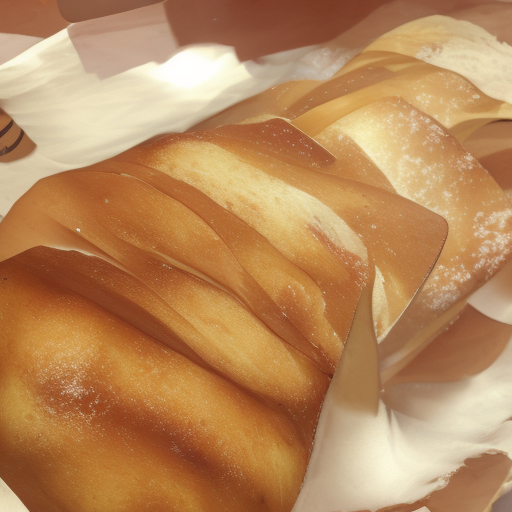Freshly Baked Bread: The Sweet Smell of Success

1. The aroma of freshly baked bread
The aroma of freshly baked bread is one of the most delightful smells in the world. It fills kitchens and homes with a warm, inviting scent that brings people together. The smell of bread baking is so comforting that it has been used in therapy to improve mood and reduce stress. The fragrance of freshly baked bread is so enticing that it can even trigger memories and emotions from our past. For many people, the smell of bread baking is a reminder of childhood, family gatherings, and happy times.

2. The history of bread making
From ancient civilizations to modern times, bread has been a staple in human diets. The earliest known evidence of bread making dates back to around 3000 BC in Egypt, where it was made from barley and eaten with soup. In ancient Greece, bread was considered a luxury item and was often given as a gift. In medieval Europe, bread was the main source of carbohydrates and was consumed three times a day. The development of the oven allowed for the mass production of bread, which became an important food source during times of war. Today, bread remains a popular food around the world, with countless varieties and techniques for making it.

3. The benefits of eating freshly baked bread
Eating freshly baked bread can have numerous health benefits. First and foremost, it is often made with whole grains, which provide essential nutrients like fiber, vitamins, and minerals that can improve overall health. Additionally, freshly baked bread has a lower glycemic index compared to store-bought bread, meaning it releases energy slowly and steadily, preventing spikes in blood sugar levels. Furthermore, consuming freshly baked bread may boost immunity due to its natural probiotic properties, as the fermentation process creates beneficial bacteria that aid digestion. Finally, the satisfaction of enjoying a freshly baked loaf can bring joy and comfort, potentially improving mental wellbeing.

4. How to make homemade bread
The joy of making homemade bread from scratch is unmatched by any store-bought loaf. With just a few simple ingredients and some elbow grease, you can create a delicious, freshly baked loaf that is sure to satisfy your taste buds. Here’s how to make homemade bread step-by-step:
Ingredients:
* 2 cups all-purpose flour
* 1 teaspoon salt
* 1 teaspoon sugar
* 1 tablespoon active dry yeast
* 3/4 cup warm water
* 2 tablespoons olive oil
Instructions:
1. In a large mixing bowl, whisk together the flour, salt, and sugar until well combined.
2. Add the yeast and warm water, and stir until the mixture becomes smooth and free of lumps.
3. Let the dough rest for 10 minutes to allow the yeast to activate.
4. After 10 minutes, add the olive oil and mix until fully incorporated.
5. Turn the dough out onto a lightly floured surface and knead for 10-15 minutes, or until the dough becomes smooth and elastic.
6. Place the dough in a greased bowl, cover with a clean towel, and let it rise in a warm place for 1 hour, or until it has doubled in size.
7. Once the dough has risen, punch it down to release any air pockets and divide it into two equal pieces.
8. Roll each piece into a ball and place them onto a greased baking sheet.
9. Cover the loaves with a clean towel and let them rise again for another 30 minutes.
10. Preheat your oven to 375°F (190°C).
11. Bake the loaves for 25-30 minutes, or until they are golden brown and sound hollow when tapped on the bottom.
12. Remove the loaves from the oven and let them cool on a wire rack before slicing and serving.
With these easy-to-follow instructions, you can create your own freshly baked bread at home. From the soft, pillowy texture of white bread to the tangy, sour flavor of sourdough, there’s nothing quite like the taste of homemade bread. So why not give it a try? Your taste buds will thank you!

5. Tips for perfecting your bread recipe
Here are some tips for perfecting your bread recipe:
1. Start with high-quality ingredients: Using the best flour, yeast, salt, and other ingredients can make a big difference in the final product.
2. Measure your ingredients accurately: Accurate measurements ensure that your dough has the right consistency and texture.
3. Knead the dough thoroughly: Kneading the dough helps to develop gluten and creates a chewy, elastic crumb.
4. Let the dough rise properly: Allowing the dough to rise in a warm, draft-free area until it has doubled in size helps to create a lighter, fluffier bread.
5. Don’t overwork the dough: Overworking the dough can lead to a tough, dense bread.
6. Experiment with different techniques: Try different methods of shaping and proofing your bread to achieve the desired results.
7. Be patient: Good things take time, and bread is no exception. Allow your bread to rise and bake slowly for the best results.

6. The art of sourdough bread making
Sourdough bread making is an ancient craft that has been passed down through generations. It involves using wild yeast and flour to create a natural leavening agent, which produces a tangy, slightly sour flavor in the bread. This method of bread making requires patience and attention to detail, as the dough must be carefully tended to and allowed to ferment for several days before it can be baked. However, the end result is a loaf of bread that is not only delicious, but also incredibly nutritious. Sourdough bread is made without commercial yeast, which means that it does not contain any added preservatives or artificial ingredients. Additionally, the fermentation process breaks down the gluten in the flour, making it easier for people with gluten sensitivities to digest. For those who are interested in learning how to make sourdough bread, there are many resources available online and in cookbooks. With a bit of practice and dedication, anyone can become proficient at this timeless art.

7. Bread as a symbol of hospitality
Bread has been a staple food for thousands of years, and throughout history, it has played a significant role in many cultures as a symbol of hospitality. In ancient times, guests were often welcomed into a home with a loaf of freshly baked bread, which was seen as a gesture of goodwill and a sign of abundance. This tradition continues to this day, with many people offering bread to guests as a way of showing hospitality and warmth.
In addition to its practical uses, bread has also been used as a symbol of spiritual significance in many religions. For example, in Christianity, bread is often used during communion ceremonies as a representation of the body and blood of Jesus Christ. In Hinduism, bread is sometimes offered to gods and goddesses as a form of prayer or devotion.
Overall, bread has been an important part of human culture for centuries, not just as a food source, but also as a symbol of hospitality and connection. Whether you’re sharing a loaf of freshly baked bread with friends and family or using it as a symbol of spiritual significance, there’s no denying the power and importance of this simple yet versatile food.

8. The impact of bread on different cultures
Bread has been a staple food in many cultures around the world for thousands of years. Its versatility and accessibility have made it a symbol of sustenance and celebration in countless traditions. From the flatbreads of the Middle East to the crusty loaves of Europe, bread has played a central role in the culinary and cultural heritage of many nations. In some societies, bread is still made by hand using ancient techniques passed down through generations, while in others, modern technology has transformed the production process. Despite these differences, one thing remains constant: the deep connection between bread and the communities that have shaped its history.

9. The rise of specialty bread shops
The rise of specialty bread shops has been a phenomenon in recent years. With the increasing popularity of artisanal and craft breads, many people have turned to these small, independent bakeries for their freshly baked loaves. These specialty bread shops offer a wide variety of unique and flavorful breads made with high-quality ingredients and traditional techniques. From sourdough to rye, from ciabatta to baguettes, there is something for everyone at these specialty bread shops. In addition to offering a great selection of breads, these shops often also sell other artisan goods such as pastries, cheeses, and olive oils. As a result, they have become a destination for food enthusiasts and a staple in many neighborhoods. The rise of specialty bread shops is a testament to the power of freshly baked bread and its ability to bring people together over a shared love of good food.

10. Conclusion: Why freshly baked bread is worth the effort
In conclusion, the sweet smell of freshly baked bread is a delight to behold and a treat to indulge in. From its rich history to its numerous benefits, it’s clear that bread has played a significant role in human culture and cuisine. Making homemade bread is a rewarding experience that allows us to connect with our culinary past while enjoying the many health benefits it offers. Whether you’re a seasoned baker or just starting out, there’s always room to improve your skills and create your own unique recipes. So why not give it a try? The effort put into making freshly baked bread is well worth it, and the rewards are truly delicious.





0 Comments